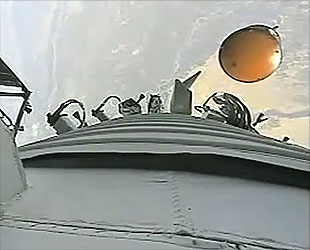November 18, 2016 — Two Chinese astronauts returned to Earth early Friday morning (Nov. 18) after a month-long space lab mission that set a new record for their country's human spaceflight program and advanced preparations for China's first space station.
Jing Haipeng, 50, and Chen Dong, 37, who launched on board China's Shenzhou 11 spacecraft on Oct. 16, landed at 12:59 a.m. EST (0559 GMT or 1:59 p.m. Beijing time) in the Inner Mongolia Autonomous Region of China. Their 32 days in space more than doubled China's previous longest crewed mission.
Jing, who is now China's first veteran of three spaceflights, and Chen, who was on his first mission, spent 30 days on board the Tiangong-2 space lab, working on maintenance techniques, conducting science experiments and speaking with students and government leaders on the ground.

Taikonauts Jing Haipeng and Chen Dong are seen after landing on board China's Shenzhou 11 spacecraft on Nov. 18. (Xinhua) |
On Wednesday (Nov. 16), the two taikonauts boarded their Shenzhou 11 spacecraft and undocked from the Tiangong-2, beginning a two-day journey back to Earth. Descending under a parachute on Friday, the Shenzhou capsule fired retro-thrusters just before safely touching down and tipping onto its side.
Live television views from recovery helicopters and ground rescue vehicles showed the capsule's descent, though the coverage was brief due to poor visibility in the area. Once on the ground, the capsule was met by recovery teams to assist the crew out of the spacecraft.
Both taikonauts were reported to be in good health. After a brief period at their landing site, Jing and Chen were to be flown to Beijing Space City to rehabilitate from their time in space and to brief officials on their mission.
The Shenzhou 11 flight was the first and, as planned, only crewed mission to the Tiangong-2, which was launched in September. The space lab will remain in orbit as a platform for remotely-operated experiments and to receive China's first automated resupply and refueling vehicle, Tianzhou-1, which is slated for launch in the first half of 2017.

The Shenzhou 11 descent capsule is seen as it separates from the orbital module prior to re-entry into Earth's atmosphere. (CCTV) |
During their month on board the space lab, Jing and Chen served as correspondents for Xinhua news service, filing a "Space Journal" describing their life aboard the Tiangong-2. The taikonauts wrote about their daily routine, the space suits they wore, how they exercised and the food they ate.
In their last entry before leaving for Earth, they described the silkworm educational experiment they conducted as "a space lesson for Earth's children."
"Five out of the six silkworms taken aboard our Tiangong-2 space lab have cocooned," Jing and Chen wrote. "We've put them in cold containers. The sixth [silkworm] wasn't as strong as the others and it didn't move much."
The two were also the first Chinese astronauts to cultivate edible crops (lettuce) in space.

Chen Dong and Jing Haipeng, as seen aboard Tiangong-2. (Xinhua) |
"The seeds germinated on the [flight's] fifth day. We were so excited we took some selfies with them," Jing and Chen described. "Our lettuce looked especially fresh and even greener than those on Earth, though we only tend to them for 10 minutes each day."
"Sadly, our lettuce is only for experimental purposes, and not to be eaten," they noted.
Jing has now logged 47 days in space, including 3 days on the Shenzhou 7 flight in 2008 and 13 days on Shenzhou 9 in 2012. Chen was the eleventh Chinese astronaut to fly in space since Yang Liwei became the nation's first taikonaut aboard Shenzhou 5 in 2003. Shenzhou 11 marked China's sixth human spaceflight.
China's next crewed mission is scheduled for 2018, after the launch of the core module for the country's first space station.
